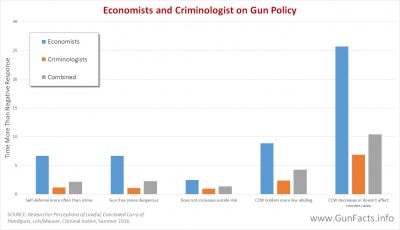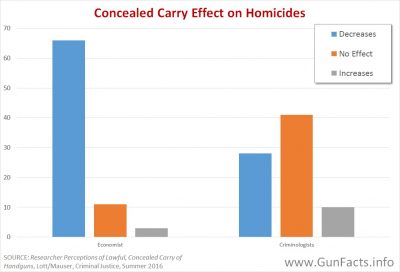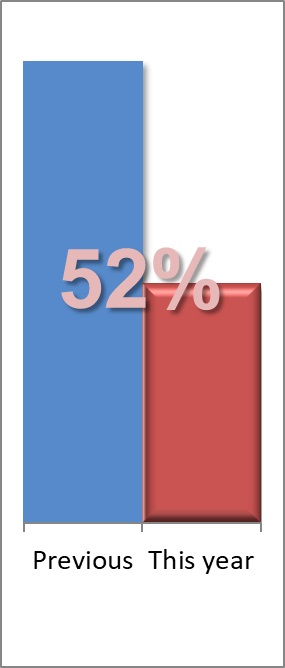Number Nuts
When both economists and criminologists think that concealed carry either decreases or does not change homicide rates, we may have scientific consensus.
Main take-aways:
- Survey of economists and criminologists
- Only surveyed those who have published in peer reviewed publications
- Only surveyed those who studied empirical data
- Scientific consensus is that:
- Guns prevent crime more than cause it
- “Gun free” zones are dangerous
- Guns do not change suicide risk
- CCW licensees are very law abiding
- CCWs decrease or do not change homicide rates
Studying People Who Study Guns
Both economist and criminologists study crime. They take different views of it, the former examining crime as a rational response to risk and opportunity, and the latter from a legalistic and bureaucratic process.
This caused economist John Lott and criminologist Gary Mauser to team-up and survey their peers on a small set of gun related issues. 1 The goal was to see if there was a general agreement about some gun policy, and if the two camps differed greatly.
The short story is that both camps largely skew in the same direction on all questions, and their joint direction shows that guns and concealed carry licensees do not create a problem, and may well decrease violence. Interestingly, economists (who, frankly are a bit better at statistical analysis than criminologists) find guns to be a net societal good, more so than criminologists. As Lott and Mauser summarized in the report:
Researchers, as a group, believe that guns are used more in self-defense than in crime; gun-free zones attract criminals; guns in the home do not increase the risk of suicide; concealed handgun permit holders are much more law-abiding than the typical American; and that permitted concealed handguns lower the murder rate. All those results were statistically significant.
Questioning the Questioners
Lott and Mauser asked five basic questions of mainly American researchers. The questions were:
- In the United States, are guns used in self-defense more often than they are used in the commission of crime?
- Are gun-free zones, areas where civilians are banned from having guns, more likely to attract criminals than they are to deter them?
- Would you say that, in the United States, having a gun in the home causes an increase in the risk of suicide? (note, this is an inverted question, so we present the data in reverse so the charts aligns properly)
- Would you say that concealed handgun permit holders are much more law-abiding than the typical American?
- How does allowing people to carry a permitted, concealed handgun affect the murder rate?
Numbers Don’t Lie
 Immediately, we notice that economists and criminologists believe that concealed carry does not increase homicide. More than any other topic, the alignment between people who crunch a lot of numbers on this subject is compelling.
Immediately, we notice that economists and criminologists believe that concealed carry does not increase homicide. More than any other topic, the alignment between people who crunch a lot of numbers on this subject is compelling.
What this chart does not expose is that 66% of economists and 28% of criminologists believe that concealed carry decreases homicides, and that 77% and 69% respectively think it either decreases or doesn’t change homicide rates (only 3% and 10% think it increases homicides, and the rest simply don’t know).
 Ponder that for a moment. Aggregated, 73% of these professionals believe that concealed carry is good or at least not bad, and only 7% think otherwise. A more ringing endorsement cannot be found outside of an NRA convention.
Ponder that for a moment. Aggregated, 73% of these professionals believe that concealed carry is good or at least not bad, and only 7% think otherwise. A more ringing endorsement cannot be found outside of an NRA convention.
Another interesting consensus, and as important to people murdered in movie theaters and bars, is that a full 55% of these researchers know that “gun free” zones are more likely to attract the kind of people who might shoot up the joint than keep them away (another 24% think lunatics don’t care much either way). Pair this with their opinions on CCWs stopping homicides and that guns are more often used in self-defense than in crime, and we see a clear picture: not preventing people from carrying firearms in public is a good idea.
Notes:
- Researcher Perception of Lawful, Concealed Carry of Handguns, Lott/Mauser, Criminal Justice, Summer 2016 ↩


Comments
Number Nuts — No Comments
HTML tags allowed in your comment: <a href="" title=""> <abbr title=""> <acronym title=""> <b> <blockquote cite=""> <cite> <code> <del datetime=""> <em> <i> <q cite=""> <s> <strike> <strong>